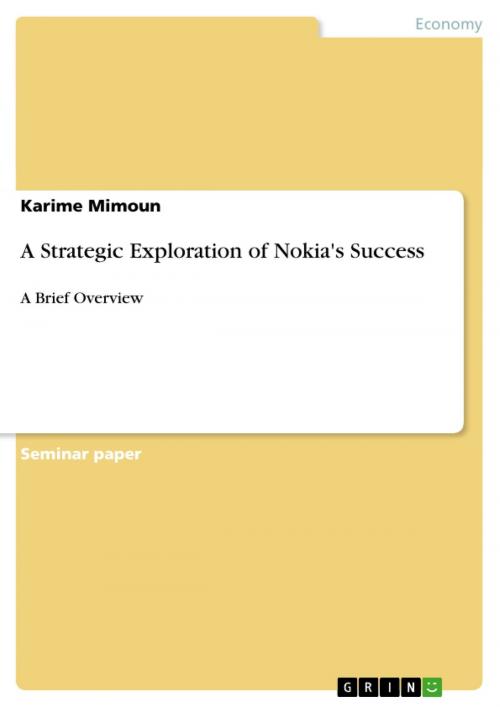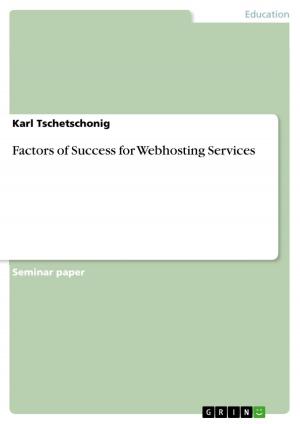A Strategic Exploration of Nokia's Success
A Brief Overview
Business & Finance, Management & Leadership, Management| Author: | Karime Mimoun | ISBN: | 9783640340262 |
| Publisher: | GRIN Publishing | Publication: | June 4, 2009 |
| Imprint: | GRIN Publishing | Language: | English |
| Author: | Karime Mimoun |
| ISBN: | 9783640340262 |
| Publisher: | GRIN Publishing |
| Publication: | June 4, 2009 |
| Imprint: | GRIN Publishing |
| Language: | English |
Seminar paper from the year 2009 in the subject Business economics - Business Management, Corporate Governance, grade: 85%, University of the West of England, Bristol, language: English, abstract: Nokia's became in a few decades a global player and market leader in the mobile phone sector, its achievement is based on exclusive strategy decisions which this working paper attempts to explore. Nokia managed to overcome its path dependency and redefined itself continuously until it became a world leader in its core businesses; mobile phones and network equipments. Nokia started its evolvement as wood company for nearly 150 years and Nokia's business portfolio covered amongst others power, cable, rubber, toilet paper, televisions, radiophone, radar et cetera until Nokia focused on its core businesses. The question we try to explore in this paper is; what were the strategic key success factors which enabled Nokia to become a world leader in telecommunication. The examination starts with the adaptive strategy process of Nokia and how the market circumstances leveraged Nokia's rose and success in the communication industry in the 90s. In the next step we identify Nokia's competitive advantage based on knowledge integration and strategic capabilities. In the course of the knowledge integration we analyse Nokia's network strategy and its ability to understand early inflection points to survive the slowdown in 2000. Finally, we consider some hazards for Nokia and proof its sustainability through its latest innovative progress.
Seminar paper from the year 2009 in the subject Business economics - Business Management, Corporate Governance, grade: 85%, University of the West of England, Bristol, language: English, abstract: Nokia's became in a few decades a global player and market leader in the mobile phone sector, its achievement is based on exclusive strategy decisions which this working paper attempts to explore. Nokia managed to overcome its path dependency and redefined itself continuously until it became a world leader in its core businesses; mobile phones and network equipments. Nokia started its evolvement as wood company for nearly 150 years and Nokia's business portfolio covered amongst others power, cable, rubber, toilet paper, televisions, radiophone, radar et cetera until Nokia focused on its core businesses. The question we try to explore in this paper is; what were the strategic key success factors which enabled Nokia to become a world leader in telecommunication. The examination starts with the adaptive strategy process of Nokia and how the market circumstances leveraged Nokia's rose and success in the communication industry in the 90s. In the next step we identify Nokia's competitive advantage based on knowledge integration and strategic capabilities. In the course of the knowledge integration we analyse Nokia's network strategy and its ability to understand early inflection points to survive the slowdown in 2000. Finally, we consider some hazards for Nokia and proof its sustainability through its latest innovative progress.















